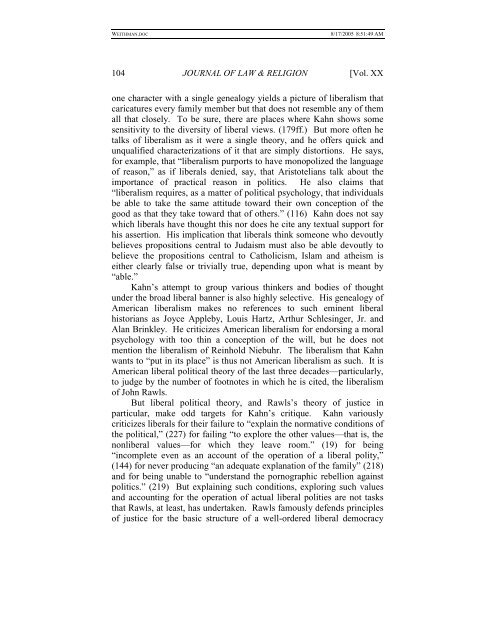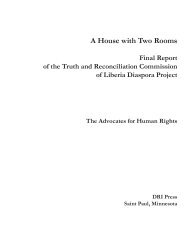Putting Liberalism in its Place, by Paul W. Kahn - Hamline University ...
Putting Liberalism in its Place, by Paul W. Kahn - Hamline University ...
Putting Liberalism in its Place, by Paul W. Kahn - Hamline University ...
Create successful ePaper yourself
Turn your PDF publications into a flip-book with our unique Google optimized e-Paper software.
WEITHMAN.DOC 8/17/2005 8:51:49 AM<br />
104 JOURNAL OF LAW & RELIGION [Vol. XX<br />
one character with a s<strong>in</strong>gle genealogy yields a picture of liberalism that<br />
caricatures every family member but that does not resemble any of them<br />
all that closely. To be sure, there are places where <strong>Kahn</strong> shows some<br />
sensitivity to the diversity of liberal views. (179ff.) But more often he<br />
talks of liberalism as it were a s<strong>in</strong>gle theory, and he offers quick and<br />
unqualified characterizations of it that are simply distortions. He says,<br />
for example, that “liberalism purports to have monopolized the language<br />
of reason,” as if liberals denied, say, that Aristotelians talk about the<br />
importance of practical reason <strong>in</strong> politics. He also claims that<br />
“liberalism requires, as a matter of political psychology, that <strong>in</strong>dividuals<br />
be able to take the same attitude toward their own conception of the<br />
good as that they take toward that of others.” (116) <strong>Kahn</strong> does not say<br />
which liberals have thought this nor does he cite any textual support for<br />
his assertion. His implication that liberals th<strong>in</strong>k someone who devoutly<br />
believes propositions central to Judaism must also be able devoutly to<br />
believe the propositions central to Catholicism, Islam and atheism is<br />
either clearly false or trivially true, depend<strong>in</strong>g upon what is meant <strong>by</strong><br />
“able.”<br />
<strong>Kahn</strong>’s attempt to group various th<strong>in</strong>kers and bodies of thought<br />
under the broad liberal banner is also highly selective. His genealogy of<br />
American liberalism makes no references to such em<strong>in</strong>ent liberal<br />
historians as Joyce Apple<strong>by</strong>, Louis Hartz, Arthur Schles<strong>in</strong>ger, Jr. and<br />
Alan Br<strong>in</strong>kley. He criticizes American liberalism for endors<strong>in</strong>g a moral<br />
psychology with too th<strong>in</strong> a conception of the will, but he does not<br />
mention the liberalism of Re<strong>in</strong>hold Niebuhr. The liberalism that <strong>Kahn</strong><br />
wants to “put <strong>in</strong> <strong>its</strong> place” is thus not American liberalism as such. It is<br />
American liberal political theory of the last three decades—particularly,<br />
to judge <strong>by</strong> the number of footnotes <strong>in</strong> which he is cited, the liberalism<br />
of John Rawls.<br />
But liberal political theory, and Rawls’s theory of justice <strong>in</strong><br />
particular, make odd targets for <strong>Kahn</strong>’s critique. <strong>Kahn</strong> variously<br />
criticizes liberals for their failure to “expla<strong>in</strong> the normative conditions of<br />
the political,” (227) for fail<strong>in</strong>g “to explore the other values—that is, the<br />
nonliberal values—for which they leave room.” (19) for be<strong>in</strong>g<br />
“<strong>in</strong>complete even as an account of the operation of a liberal polity,”<br />
(144) for never produc<strong>in</strong>g “an adequate explanation of the family” (218)<br />
and for be<strong>in</strong>g unable to “understand the pornographic rebellion aga<strong>in</strong>st<br />
politics.” (219) But expla<strong>in</strong><strong>in</strong>g such conditions, explor<strong>in</strong>g such values<br />
and account<strong>in</strong>g for the operation of actual liberal polities are not tasks<br />
that Rawls, at least, has undertaken. Rawls famously defends pr<strong>in</strong>ciples<br />
of justice for the basic structure of a well-ordered liberal democracy
















